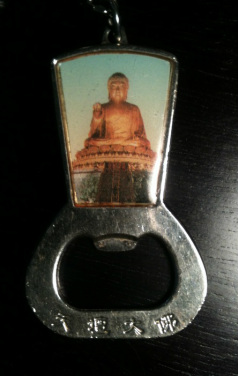
Despite all this commercial despoiling of one religious location, Buddhism in general is still in good shape and from my point of view is likely to remain so for many years to come. To be clear, there are mystical elements to the belief system that I think should be forgotten. Traditional biographies of the man who found enlightenment under a bodhi tree generally include "numerous miracles, omens, and supernatural events...including: a painless birth conceived without intercourse; no need for sleep, food, medicine, or bathing; omniscience; and the ability to suppress karma" (however that is achieved). In modern times though there has been a more concerted effort to portray a secular picture of Siddhartha Gautama's life by omitting the traditional supernatural elements of his early biographies. In any event, the ancient Indians were generally unconcerned with historical chronologies and were instead more focused on philosophy, so many of the Buddhist texts reflect this tendency and provide a clearer picture of what Gautama may have taught rather than of the dates and events of his natural (or otherwise purported) life. In sympathy with this modern evolution of Buddhism, I have also focused more on its philosophical beliefs when I evaluated its main tenets against my worldview based on an evolutionary philosophy. Specifically, I had this to say in my Survival of the Fittest Philosophers section on the Buddha:
------------------------------------------------
Guatama Buddha (563-483 BCE) spiritual teacher from the Indian subcontinent, on whose teachings Buddhism was founded.
Survives
Gautama discovered what Buddhists call the Middle Way - a path of moderation away from the extremes of self-indulgence and self-mortification. Yes. We must strike the balances between short-term and long-term, self and society, and competition and cooperation. Anyone preaching one or the other is overly simple.
The Noble Eightfold Path: right view, right intention, right speech, right action, right livelihood, right effort, right mindfulness, and right concentration. Nothing wrong here once “right” is understood.
Rejection of the infallibility of accepted scripture: Teachings should not be accepted unless they are borne out by our experience and are praised by the wise. Buddha would have been a strong proponent of the scientific method for discovering truth.
There is no intermediary between mankind and the divine; the Buddha is only a guide and teacher for beings who must tread the path of Nirvana themselves to attain spiritual awakening and understand reality. Buddha would also be a strong opponent of organized religion. Focus on the secular definition of divine being excellent and delightful. Think of the path of Nirvana as the path filled with bliss, peace, and enlightenment. Define your mind and personality as your spirit. A guide for understanding the reality of these things would be wonderful.
Nirvana: It is possible for sentient beings to realize a dimension of awareness that is totally unconstructed and peaceful, and end all suffering due to the mind's interaction with the conditioned world. Suffering can be alleviated by doing what is possible to live well and accepting the world for what it is when temporary pain is unavoidable.
Needs to Adapt
The Four Noble Truths: 1) suffering is an ingrained part of existence; 2) the origin of suffering is craving for sensuality, acquisition of identity, and annihilation; 3) suffering can be ended; 4) following the Noble Eightfold Path is the means to accomplish this. Suffering does seem unavoidable, but its absolute root cause is the battle between life and death. Sensuality and identity are necessary for life in the short and long run. Suffering comes when we are unable to balance the needs of the short-term and the needs of the long-term. Pain is inflicted when others are unable to strike this balance, or the bodies or environments we inherited fail to provide life.
Gone Extinct
Rebirth is the doctrine that upon death the evolving consciousness becomes one of the contributing causes for the arising of a new aggregation. The consciousness in the new person is neither identical nor entirely different from that in the deceased but the two form a causal continuum or stream. Rebirth is conditioned by the karmas (actions of body, speech, and mind) of previous lives; good karmas will yield a happier rebirth, bad karmas will produce one which is more unhappy. The basic cause for this is the abiding of consciousness in ignorance; when ignorance is uprooted, rebirth ceases. There is no such thing as reincarnation. Neither is there any way for learned behaviors or non-genetic changes to the body to be passed on to descendants. Capabilities can be passed on. Culture can be passed on. Focus on realizing your capabilities and contributing to a life-giving culture and you can be happy with the one life you lead.
---------------------------------------------------------
Please take a moment to share your own thoughts about this tradition if you think I have missed or misrepresented anything crucial to its consideration. As always, your words are welcome.

